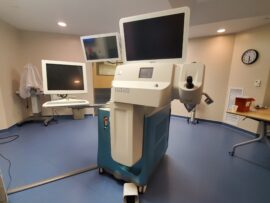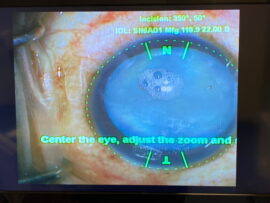Opening Our Eyes to Possibilities – Resolutions for Self-Improvement
Posted by: SightTrust Eye Institute in Cataracts, IOLs, Presbyopia
It’s another new year, and another new opportunity to make exciting resolutions for self-improvement in 2024. While research shows that many Americans make New Year’s resolutions each year, just 9% actually keep their resolutions the whole year. Unfortunately, many people learn to live with the inconveniences of health issues they don’t see as urgent because […]
Read MoreClear Vision: Understanding Presbyopia and Cataracts
Posted by: SightTrust Eye Institute in Cataracts, Presbyopia
We all desire crystal-clear vision. For some, 20/20 eyesight comes naturally, but for others, perfect vision requires remains elusive. Thanks to modern technology, there are numerous options and procedures to correct even the worst eyesight. Unfortunately, there is one thing that always gets in the way of perfect vision – aging. Cataracts Cataracts occur as […]
Read MoreHaving Trouble Reading Menus? We can help!
Posted by: SightTrust Eye Institute in Presbyopia, Refractive Surgery
It comes on gradually, often so slowly you don’t even realize it’s even happening. One day you find yourself in a dimly-lit restaurant and you can barely read the menu. Does that say “cheese steak” or “cheese cake”? You may be wondering why this is happening and find it very frustrating, but as it turns […]
Read MoreAbout SightTrust Eye Institute
Posted by: SightTrust Eye Institute in About
“Excellent experience, efficient, caring, and knowledgeable. Next day feeling myself again with my vision improving every hour. Highly recommend.” – M.M. “This experience was great. I can see both distance and far – no glasses, no contacts. What a difference!! I recommend this to everyone who has vision troubles. Greatest staff ever – best money […]
Read MoreWhy are Colors Not as Vibrant as They Once Were?
Posted by: SightTrust Eye Institute in FAQ
Our eyes are the windows to the world, allowing us to experience the beauty and wonder that surrounds us. But what happens when those windows become clouded? Cataracts are a natural part of the aging process. They occur as the normally clear lens of the eye becomes cloudy or opaque. This cloudiness can develop slowly […]
Read MoreSame-Day Bilateral Cataract and Refractive Surgery
Posted by: SightTrust Eye Institute in Uncategorized
Vision correction surgery has come a long way over the last several years. Lens-based procedures such as cataract and clear lens replacement surgeries can now not only improve eyesight, but also allow patients to see at all ranges without the need for glasses. Technology, procedures, and techniques have advanced to allow for faster, safer, and […]
Read MoreWhat is Presbyopia and what can we do about it?
Posted by: SightTrust Eye Institute in Presbyopia
Aging is a normal and wonderful part of life; unfortunately, no one escapes it. With age come certain benefits such as retirement or senior discounts, but there are also drawbacks to growing older. If you are 40 or older and you have begun to notice difficulty seeing or focusing on things up close, chances are […]
Read MoreThe Revolutionary Advantages of LenSx Femtosecond Laser for Cataract and Refractive Lens Replacement Surgery
Posted by: SightTrust Eye Institute in Refractive Surgery
Technological advancements in ophthalmology continually push the boundaries of what is possible in vision correction surgery. One of the most revolutionary developments in recent years is the introduction of the femtosecond laser for cataract and refractive lens replacement lens surgery. This cutting-edge technology has transformed the way these procedures are performed, offering a range of […]
Read MorePremium Intraocular Lenses and the Advantages of Each
Posted by: SightTrust Eye Institute in IOLs
The ability to see well is one of the greatest privileges of life. Our vision allows us to experience magnificent views, thrilling films, and the smiles of our loved ones. As we age, however, we all develop cataracts, which cause our vision to blur and fade, and if we live long enough, most of us […]
Read MoreCataract Awareness – Let’s Raise Awareness
Posted by: SightTrust Eye Institute in Uncategorized
Our team at SightTrust Eye Institute is excited to do our part to raise awareness about cataracts, one of the most prevalent eye conditions. Data from the CDC shows that more than 17 percent of adults over the age of 40 have a cataract in one or both eyes, and this condition affects 70 percent […]
Read More















